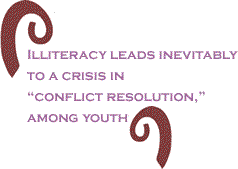
|
|||||||||||||||||||||||
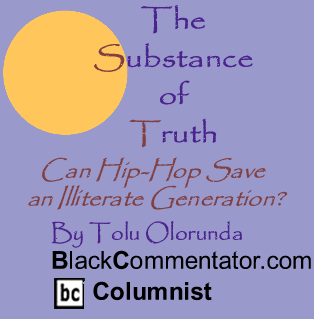
|
|

Custom Search
|
|
 |
|
| “Knowledge is Power. May that force be with you.” -Giovanni, Nikki. Racism
101 “... How many souls Hip-Hop has affected/ -Common, The Sixth Sense, Like Water for Chocolate (2000) “... Explode, my thoughts were drunken from quarts of beers/ -Nas, 2nd Childhood, Stillmatic (2001) “... The glimmers of hope provoke those without dollars to
dream/ -Nas, Book of Rhymes, God’s Son (2002) If the many statistics on functional illiteracy in the Black Community are of any merit, it’s safe to conclude that we have some difficult days ahead, in our attempts to turn this calamity around. Black and Brown kids are at the lowest rung of the ladder, in every education report tallied by any group, organization or political party still interested in their affairs - for whatever reason. Searching for higher ground, educators, mainly Black and Brown, have nearly expunged all alternatives available, and still find it difficult, largely, to account for any specific, demonstrable progress. The abysmal drop-out rate in the Black Community is a scary sight to behold, and a Black President’s assertions that, “[d]ropping out of high school is... quitting on your country,” might not be the kind of support educators were looking for. The selection of Arne Duncan, whose qualifications don’t exceed a Bachelor’s degree in Sociology, as Sec. of Education also seems to have hung out to dry the many hopes shared by community-centered educators. The hoop-dreamer’s record as Chicago’s Public School CEO screams invectives at the calls for an overhaul of the present paradigm of education, and the need for an installation of a system that values the humanity of every student - especially the Black and Brown ones. Ralph Waldo Emerson stated eloquently, in his essay on “Intellect,” the
imperative to nurture and nurse the imaginations of young students,
in their adventures, as they discover a world of possibilities surrounding
them: “Every man, in the degree in which he has wit and culture,
finds his curiosity inflamed concerning the modes of living and
thinking of other men, and especially of those classes whose minds
have not been subdued by the drill of school education.” The injection of charter and private school alternatives into the discourse on Black/Brown education has not remedied the problem. Many are of the belief that charter schools can be applied as magic wands to the failing public school system. Staunch advocates of this philosophy often exaggerate the positive results those models have produced, but are not as exuberant in admitting the damage(s) private and charter school systems have wrought in the Black Community - historically. They are unlikely to concede to studies documenting considerably worse performances in Black charter school students, vis-à-vis Black public school students. They are less likely to admit that Charter and private school programs can be capitalized upon by special interests, who hope to shorten the rope-line that guarantees equitable education to every breathing child. This theory was validated last week, in the eloquent convictions of a Republican Senator: “If you send a kid to [public] school in D.C., chances are that they will end up in a gang rather than graduating.” Sen. Jim DeMint’s worries that public schools are automatic breeding grounds for tomorrow’s gang leaders, is an ample sign of the disconnect between most lawmakers and the state of the Public/Private school systems.
Well, I’ve got good news: Help is on the way - and that help is coming through a vehicle most Public school educators have turned their backs on, for the last three decades. It always amazes me, to see Middle School and High School educators express great oblivion to Hip-Hop music/culture. It is not required that they like it, or even understand it, but it is indefensible to claim to treasure the uniqueness of young Black and Brown kids, and yet, remain indifferent and ignorant of a culture which has shaped, molded, defined, inspired, and identified them - the students. Much to the chagrin of many parents and educators, Hip-Hop music/culture has left its indelible mark on today’s youth, and it’s rather uncouth for them to discard this truth. The C. Delores Tuckers of the world have tried and failed. They have succeeded only in making themselves laughingstocks in the Hip-Hop community. Misogyny, Materialism and Machismo, are cancers in the body of Hip-Hop, but critics of the culture must also take into account the level of complicity society has managed, even as it castigates commercial Hip-Hop’s expressions of those values. Those who treasure Hip-Hop’s prophetic impulse, and seek to correct its maladies, have also taken note of its educational possibilities. As one who was compelled to study ancient philosophy, science, and astronomy, based on a Rapper’s (Canibus) obsession with those subjects, this writer is a proud member of such clique. Another member, of this collective is a Hip-Hop artist by the name of
Asheru (Gabriel Benn). A Peabody
Award-winning writer, Asheru is also an educator and intellectual.
In 2005, he co-founded a Hip-Hop literacy initiative called, “Hip
Hop Educational Literacy Program” (H.E.L.P.). H.E.L.P. is conducted
through the provision of “a series of supplemental reading workbooks
designed to HELP students of all reading levels through the innovative
usage of Hip Hop lyrics for critical analysis, multicultural relevance,
and effective literacy instruction.” Its main objective is the
promotion of “literacy, critical analysis, and differentiated
instruction while meeting the needs of all types of learners.”
As the President of H.E.L.P., and an educator for 11 years, Asheru
knows, firsthand, the state of emergency in which Black kids are
currently entrenched. His program, which received a nod
of approval from President Barack Obama, last September, and
an endorsement
from
The implementation of H.E.L.P. in the classroom is more technical than is conveniently assumed. Hip-Hop lyrics are used as vocabulary lessons, and in turn, the vocabulary word lists become the content used throughout the book. The books are broken into 4 reading levels: K-12; Elementary; Middle School; High School. The different reading levels each contain 15 activities. The brilliance of this system lies in the fact that within a specific class, all students can learn from the lessons, because of the various reading level degrees the books address. This is key because, according to Asheru, teachers are forced to deal with the “inclusion mode, which puts Special Ed students [and] General Ed students in the same classroom,” but they’re not giving “the tools and training to differentiate appropriately, and meet everyone’s need at the same time.” Why Hip-Hop? Of all the available alternatives, why Hip-Hop? The answer is simple, as Asheru sees it: “I’m a Hip-Hop artist, myself... My whole world view was shaped by Hip-Hop, as a kid growing up… Hip-Hop just had a wide variety of content, and subject-matters that could be addressed, [and] I felt like it would be the perfect spring board.” He continues: “Secondly, it’s the language that our kids speak. When I was a kid, all my teachers were [from] a different generation... Now, we’re in an age where both the teacher and student bought the T.I. album, both bought a Nintendo WII, both have an X-box. So, it’s the thing that bridges our gap - culturally and generationally.” The need to dispel some of the misconceptions about Hip-Hop is also critical,
because, as Asheru puts it, many educators have been fed the lie
that, “Hip-Hop and education are mutually exclusive - when they
aren’t.” The H.E.L.P. program is not concerned about the question
of legitimacy, because its mission is, just like every other similar
program, built on the premise of “equitable education, where
everyone gets a fair shake and opportunity.” Asheru views it
as, “imperative to be ahead of the curve, to be trend-setters,
to find new ways to disseminate and assess information.” If
this change in tune doesn’t take place, educators will continue
feeding into the current trend, which is, as Asheru sees it, the
continuing of “50% High-School drop-out rates, [and a] 20% literacy
rate in [ Another issue of concern is the increasing emotional disconnect between educators and students, according to Asheru. Teachers must “listen to what they have to say,” Asheru says. The H.E.L.P. program is a great initiative to combat this problem, because it satisfies the appetite of both parties. It engages the teacher’s curiosity, as well as the students’. H.E.L.P. gets students “active” in classroom activities, by expanding their world view through interactive curriculum, he says.
Asheru’s future plans are to further the discourse on 21st century paradigms of education, and empower teachers who might be unfamiliar with the learning styles of Black and Brown youth, in their “transition” to the Public School. He is well aware that their “Master’s program [doesn’t] prepare them for what they’re coming into the classroom to see.” He is currently writing a book on the topic, temporarily titled, “The Urban Educator’s Manual: What Your Master’s Degree Program Didn’t Teach You.” Teachers must be prepared for the mission of “emancipating” Black and Brown youth, Asheru contends. The objective should be to “teach them to teach themselves,” he adds.
Asheru’s parting message to the youth generation is as plain as it gets - and yet so powerful: “Knowledge is power;” to be illiterate is to be “half-living.” By incorporating the H.E.L.P. model into classrooms, he believes the long-awaited change in the literacy rate and education interests of Black and Brown youth will come. With a solid strategic plan put forth, in the form of H.E.L.P., Asheru hopes educators across the country, and the world, will get involved, and begin “attacking” those forces that have held back this generation of geniuses, and scholars, for so long. For more information on the H.E.L.P. program, PLEASE
visit: BlackCommentator.com Columnist, Tolu Olorunda, is an activist/writer and a Nigerian immigrant. Click here to reach Mr. Olorunda. |
|
Any BlackCommentator.com article may be re-printed so long as it is re-printed in its entirety and full credit given to the author and www.BlackCommentator.com. If the re-print is on the Internet we additionally request a link back to the original piece on our Website. Your comments are always welcome. eMail re-print notice
If you send us an eMail message we may publish all or part of it, unless you tell us it is not for publication. You may also request that we withhold your name. Thank you very much for your readership. |
|
| |
|
| March
12 , 2009 Issue 315 |
|
| Executive Editor: Bill Fletcher, Jr. |
| Managing Editor: Nancy Littlefield |
| Publisher: Peter Gamble |
| Est. April 5, 2002 |
Printer Friendly Version
in resizeable plain
text format or pdf
format. |
| Frequently Asked Questions |
 |

|
 |
 |
 |
| |
| |




























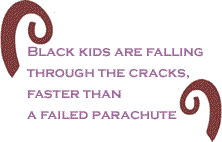 Modern-day
public school educators and administrators have certainly drilled
subversion and subordination into the psyches of Black and Brown
kids - teaching them that the most important quality in a student
is the ability/will to sit quietly in the same seat for hours, without
any interruption or interjection. This destructive model has transformed
the classroom to a laboratory - into a place where kids are experimented
on with standardized tests, and have become educational Lab Rats
for the State. Black kids are now trained to search in external
and abstract sources for intellectual compensation. They are fed
the poison that their culture, history and heritage are insufficient
in cultivating their mental faculty. Such pedagogy has handicapped
the creativity of Black kids because, as Emerson explains, “This
instinctive action never ceases in a healthy mind, but becomes richer
and more frequent in its informations through all states of culture.”
Modern-day
public school educators and administrators have certainly drilled
subversion and subordination into the psyches of Black and Brown
kids - teaching them that the most important quality in a student
is the ability/will to sit quietly in the same seat for hours, without
any interruption or interjection. This destructive model has transformed
the classroom to a laboratory - into a place where kids are experimented
on with standardized tests, and have become educational Lab Rats
for the State. Black kids are now trained to search in external
and abstract sources for intellectual compensation. They are fed
the poison that their culture, history and heritage are insufficient
in cultivating their mental faculty. Such pedagogy has handicapped
the creativity of Black kids because, as Emerson explains, “This
instinctive action never ceases in a healthy mind, but becomes richer
and more frequent in its informations through all states of culture.”
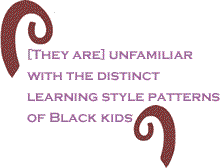 What
can be agreed upon, without any dispute, is the reality that Black
kids are falling through the cracks, faster than a failed parachute.
Black and Brown kids are wallowing in dilapidation and, as the slain
Hip-Hop artist, Tupac contended, “don't nobody else care.”
Their future has become increasingly bleak, and, without successful
intervention, bleak might soon fade to black. Many white
public school administrators / educators, who find themselves isolated
in a room filled with dark faces, often transfer unto those precious
souls the fear with which they wrestle. Unable to bridge the cultural
gap, they easily succumb to the stereotypes to which the mass media
has associated Black kids. Playing the role of police and thief,
they treat the Black/Brown males as the usual suspects in their
personalized Cops episode. Unfamiliar with the distinct learning
style patterns of Black kids, as
What
can be agreed upon, without any dispute, is the reality that Black
kids are falling through the cracks, faster than a failed parachute.
Black and Brown kids are wallowing in dilapidation and, as the slain
Hip-Hop artist, Tupac contended, “don't nobody else care.”
Their future has become increasingly bleak, and, without successful
intervention, bleak might soon fade to black. Many white
public school administrators / educators, who find themselves isolated
in a room filled with dark faces, often transfer unto those precious
souls the fear with which they wrestle. Unable to bridge the cultural
gap, they easily succumb to the stereotypes to which the mass media
has associated Black kids. Playing the role of police and thief,
they treat the Black/Brown males as the usual suspects in their
personalized Cops episode. Unfamiliar with the distinct learning
style patterns of Black kids, as 
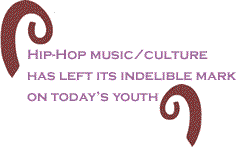 Asheru
draws the inspiration for H.E.L.P. from his frustration with the
illiteracy levels of students with whom he has worked, over the
years. He remembers seeing High School students in the detention
centers, reading on “second and third grade reading levels.”
Asheru’s vision was to create a program of “high-interest”
to the kids, even while providing something “appropriate for
their reading level.” Using Hip-Hop artists as the conduit to
transmit this vision was conducive with the utilization of their
“celebrity and influence as a springboard for discussion around
the various themes and issues… of literacy,” he says. These
themes and issues include, as Asheru sees it, “metaphors, allegories,
the parts of speech, punctuation, etc.” Through the expertise
of teachers, educators and speech therapists, the H.E.L.P. program
was formed.
Asheru
draws the inspiration for H.E.L.P. from his frustration with the
illiteracy levels of students with whom he has worked, over the
years. He remembers seeing High School students in the detention
centers, reading on “second and third grade reading levels.”
Asheru’s vision was to create a program of “high-interest”
to the kids, even while providing something “appropriate for
their reading level.” Using Hip-Hop artists as the conduit to
transmit this vision was conducive with the utilization of their
“celebrity and influence as a springboard for discussion around
the various themes and issues… of literacy,” he says. These
themes and issues include, as Asheru sees it, “metaphors, allegories,
the parts of speech, punctuation, etc.” Through the expertise
of teachers, educators and speech therapists, the H.E.L.P. program
was formed.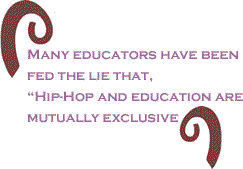 Asheru
became involved in the fight against illiteracy because he sees
it as the “key” to “all” the problems confronting
young Black and Brown students. Asked why literacy is imperative,
he answers with a level of intellectual sophistication rarely witnessed
in educators: “I believe that illiteracy is a public health issue,”
he declares. “It leads to High School Drop-out rates; it leads
to kids being unqualified to go to the job market; it leads to low
wages, which leads to selling something illegal to supplement their
low wages; [it leads to] youth incarceration, drop-out, drug-abuse,
unplanned pregnancy, and low-test scores.” Asheru takes it to
an astronomical dimension, with his insistence that illiteracy leads
inevitably to a crisis in “conflict resolution,” among youth.
He provides some sobering clarification: “A lot of kids just
could not articulate what they wanted to say, if it’s a matter of
life and death.
Asheru
became involved in the fight against illiteracy because he sees
it as the “key” to “all” the problems confronting
young Black and Brown students. Asked why literacy is imperative,
he answers with a level of intellectual sophistication rarely witnessed
in educators: “I believe that illiteracy is a public health issue,”
he declares. “It leads to High School Drop-out rates; it leads
to kids being unqualified to go to the job market; it leads to low
wages, which leads to selling something illegal to supplement their
low wages; [it leads to] youth incarceration, drop-out, drug-abuse,
unplanned pregnancy, and low-test scores.” Asheru takes it to
an astronomical dimension, with his insistence that illiteracy leads
inevitably to a crisis in “conflict resolution,” among youth.
He provides some sobering clarification: “A lot of kids just
could not articulate what they wanted to say, if it’s a matter of
life and death. 